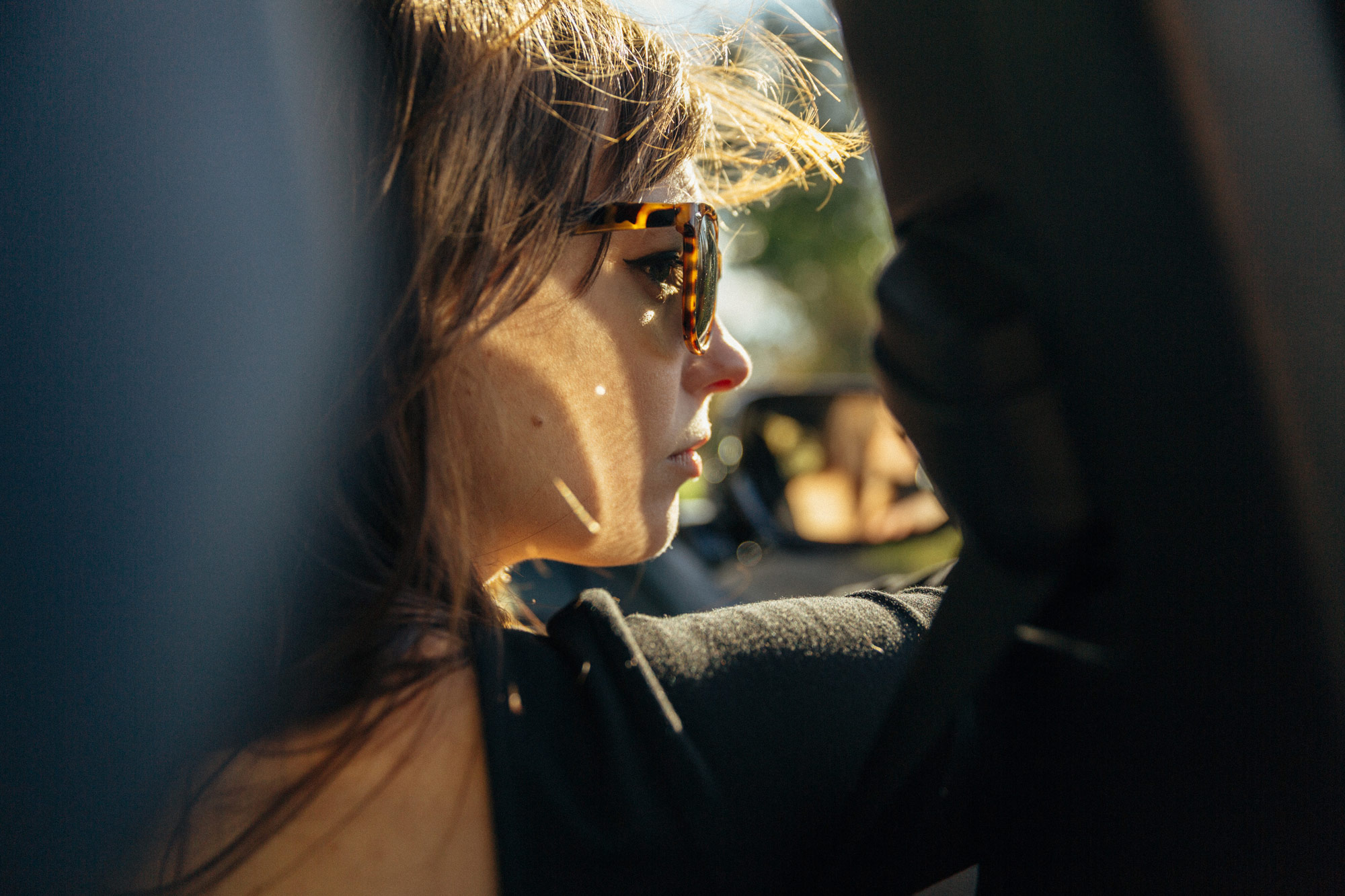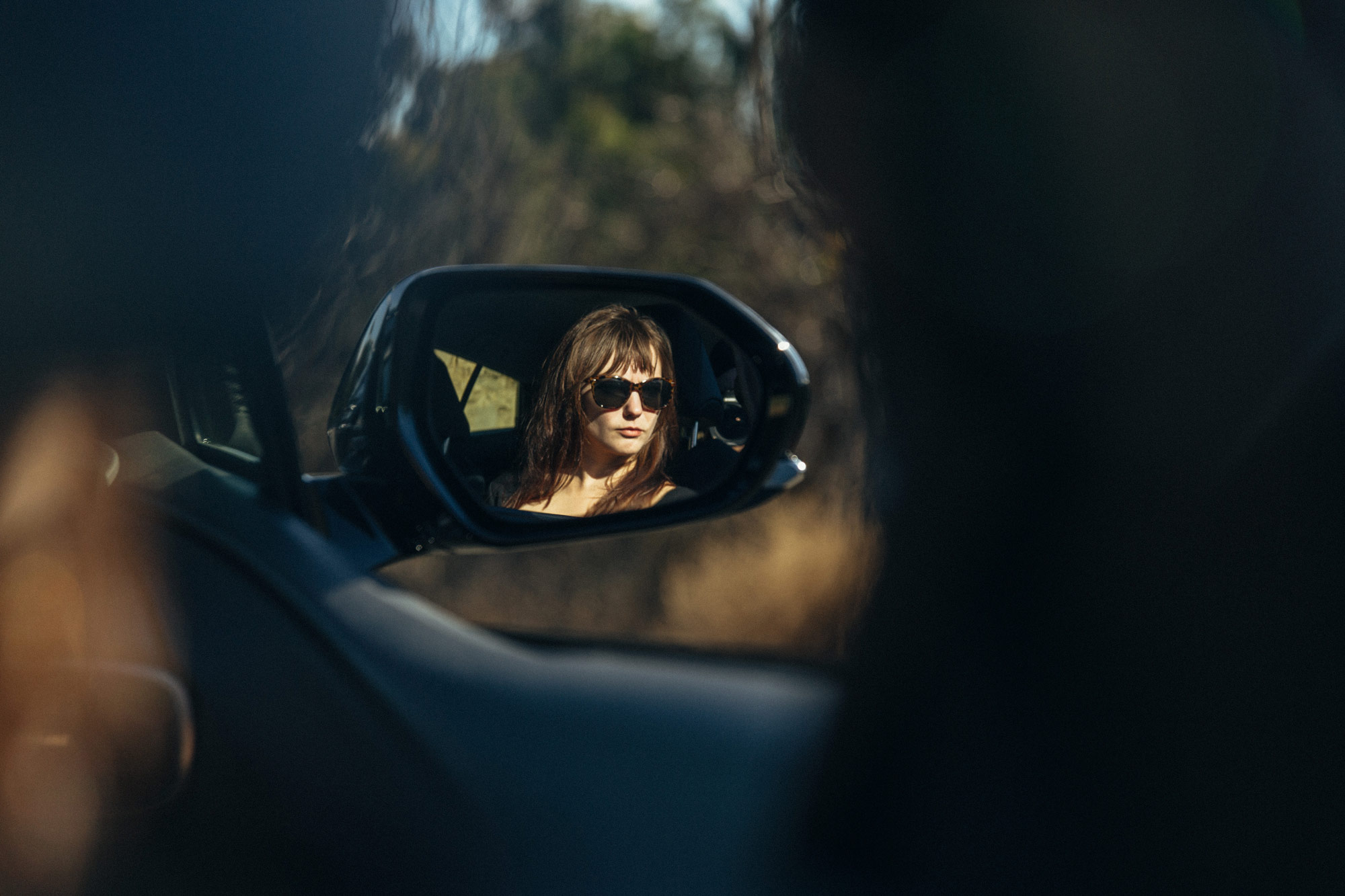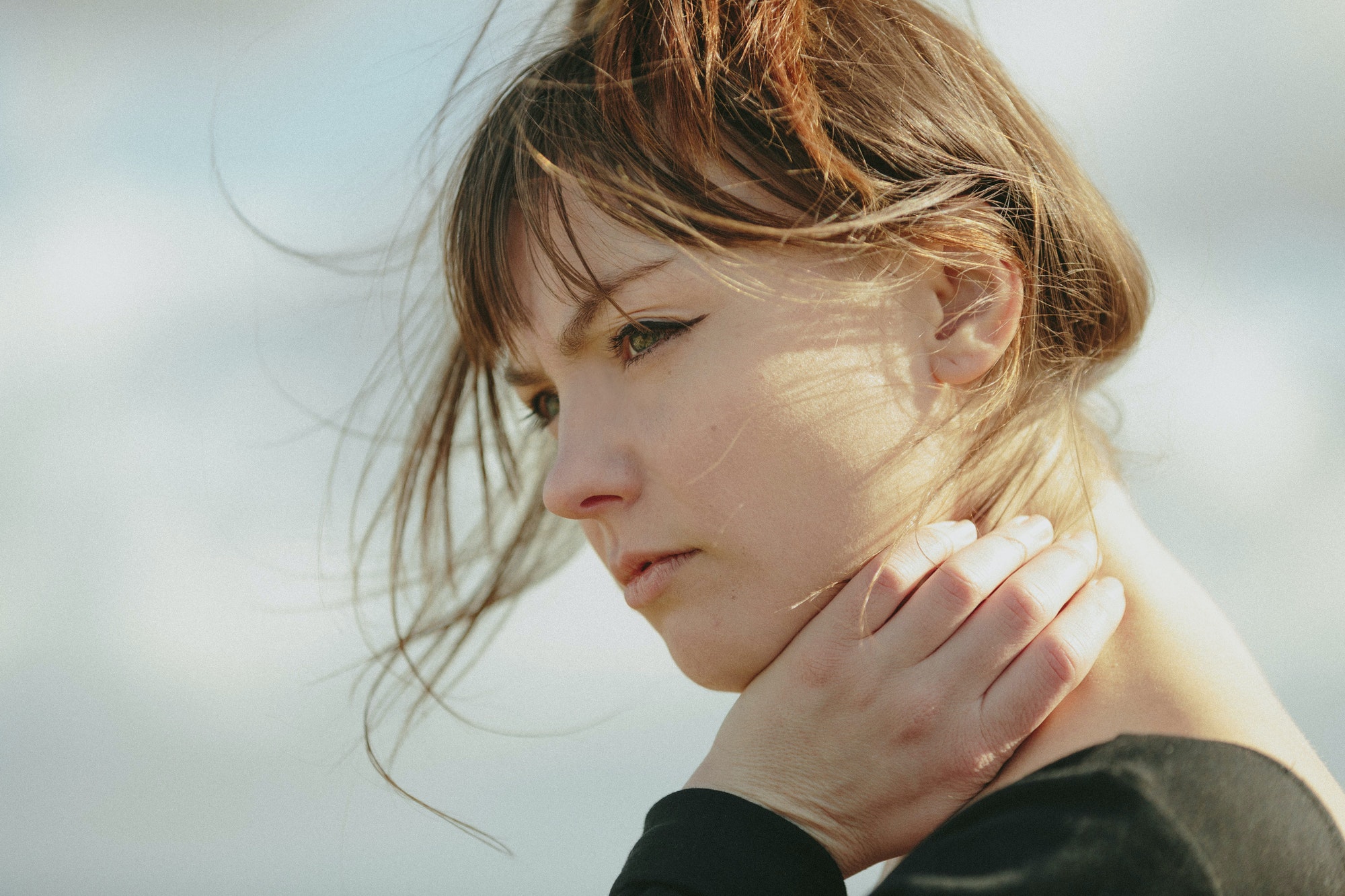
- Interview by Brandi Katherine Herrera February 13, 2018
- Photography by Elizabeth Weinberg
Angel Olsen
- musician
- songwriter
Angel Olsen’s music defies any single genre. Since her 2010 EP, the Asheville-based musician/songwriter has released multiple albums, including 2016’s acclaimed My Woman, and her most recent, Phases; each with its own distinct vision and sound. Here, Angel reflects on her past year of extensive touring and recording, the inherent politics of making music, the person vs. the performer, and what one stands to learn through the process of looking back.
I just got back from traveling. And as I was walking to grab a cup of coffee this morning before our conversation, I realized how happy I was to be home; in such familiar surroundings, with all of my own things. It made me think about how much time you’ve spent on the road over the last year and a half, and I wondered if you could talk about how it feels to finally be back home in Asheville after such extensive touring. It’s weird. When I used to get off tour, I would go from having everything on my plate to nothing; with nothing to do or to occupy my mind. I would put myself into shock reflecting on it. Now, I have a routine: I clean up my house, check on my car, run some errands—you know, adult stuff—and then make plans to have dinner with people to let them know that I’m back.
It was really hard for a few years, though, because I was gone all the time, and I had to make much more of an effort to reach out to people and keep those relationships good. Now, I really love the time I have alone. So I’ll make plans for the first week I’m back, and then slowly drop into solitude.
I never thought I would be the kind of person who didn’t like dinner parties, (laughing) but I don’t like being around large groups of people! I guess that comes from being on tour, and constantly being on display for the audience, and for my band. I get so exhausted. So when I get home, I’m just so glad to be alone, and to get to do simple things like watch movies and read books.
Going home provides the space you need to turn off the performance and just let down. What about when you’re touring? How do you balance your own needs with those of the ‘performer’ and your band? There’s the person I am when I’m alone, which is very quiet, and then there’s the public personality. My band has seen it all, but even with them I have to go into more of a charismatic character—someone who can keep the energy going.
Over the course of this year, especially, the band developed a routine. For example, if I get up early, my voice is compromised by the time we play, so I sleep in. Heather gets up super early, though, and takes naps throughout the day and she’s fine. I can’t take naps, because I have so much adrenaline. When I’m up, I’m up. We all have our different routines like that, and mine also includes spending one-on-one time with each person in the group, or going to a book store, or on a walk by myself.
It must be so nice to just disconnect like that from time to time. A walk by yourself is so powerful when you’re on tour, because your personal time is really limited.
In the van days—which I also miss a lot, ironically—I would get into reading mode. Whenever I read or really get into something, I can shut everything off and block things out. It’s dangerous, but helpful, when you’re around people all of the time. I realized that when I was stuck in a vehicle, I had the patience to get all the way through an entire book.
What are you reading right now? I’m almost finished with this book called In the Distance by Hernan Diaz. Someone gave it to me a while ago—I’ve been accumulating all of these books, which are just stacking up—and it’s really good. I also tried Lispector because someone told me she was just like Ferrante, and I was like, “No one is like Ferrante!” (laughing)
Yeah, I don’t think I’d agree with that comparison, either. (laughing) I had gotten into writers like Ferrante, Auster, and Didion, but Diaz is really good. His writing is so fluid, and I really like the book even though he’s writing about a subject I would normally find boring.
“…people will read into things and find other truths. When you put something out into the world and they attach meaning to it, it has nothing to do with you at all.”
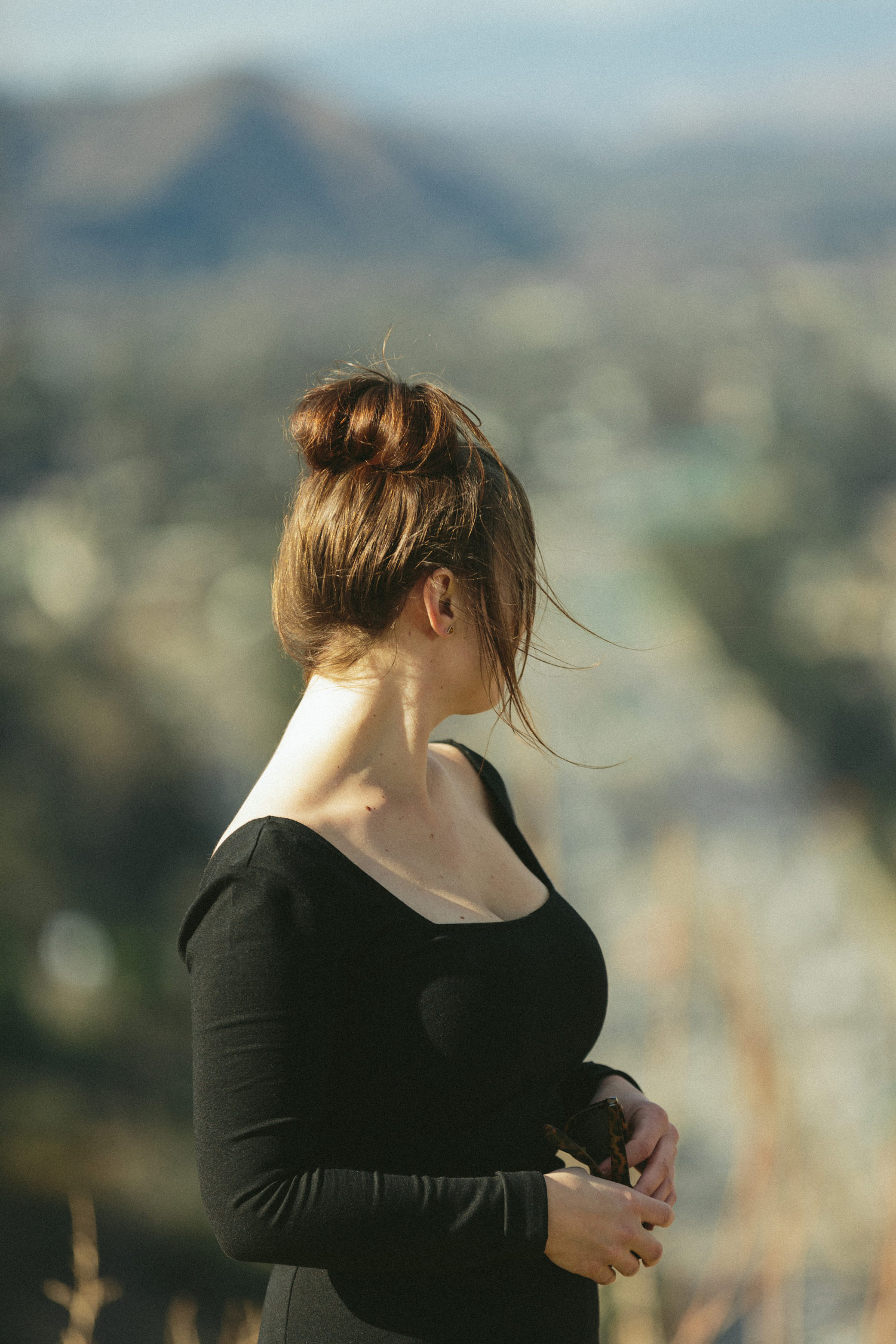
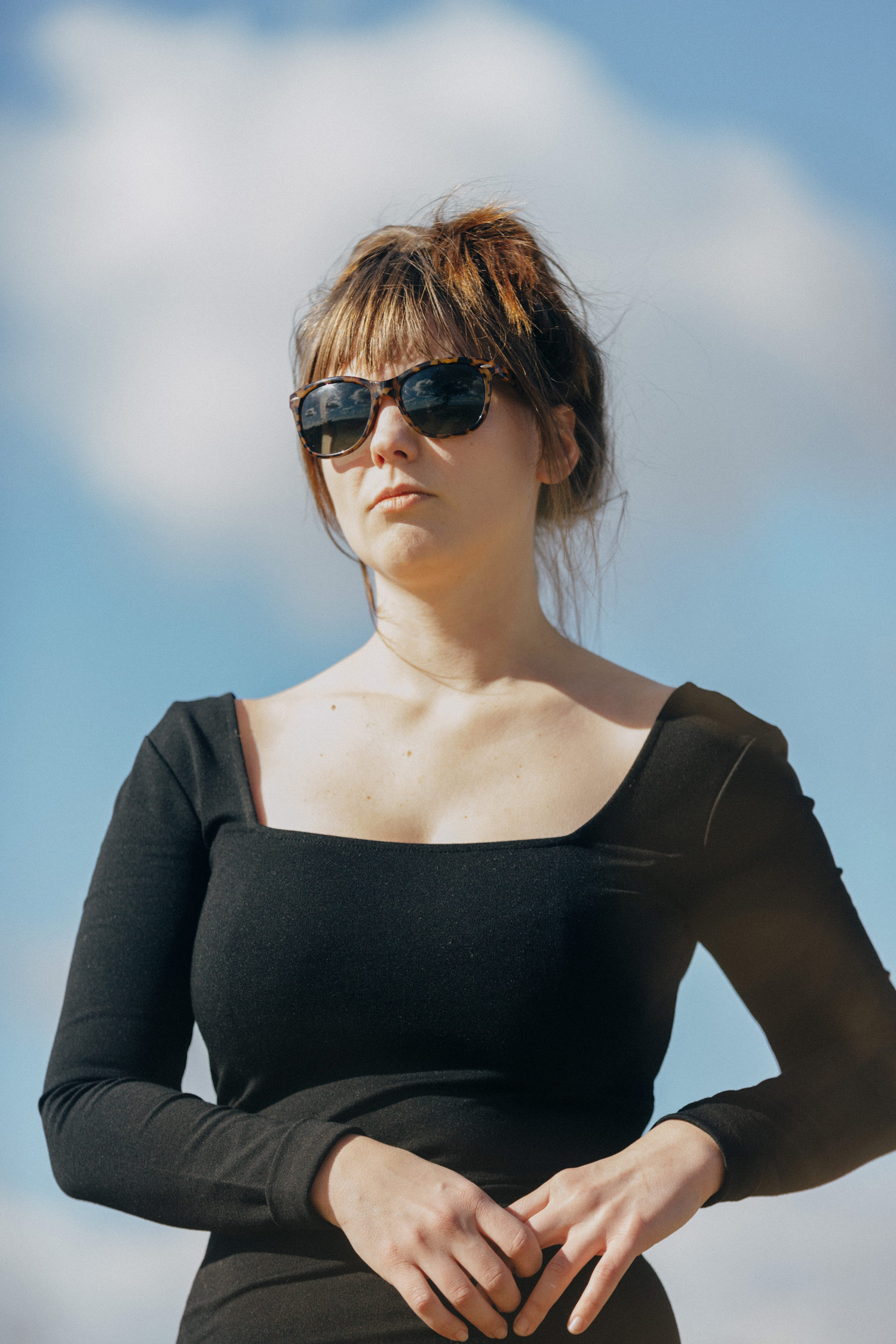
What’s it about? A boy from Sweden who moves to America with his brother to start a new life, and they get separated on a ferry. He goes around the world and ends up in California. So, in the book, he’s trying to make his way back to New York. This is in the early settlement days, so he’s learning English and being taken advantage of because he’s an immigrant. The way it’s written, though, is so fluid and beautiful—it’s like watching an intellectual Western or something. It doesn’t win you over for the first 20 pages, but it turns out to be so good.
But also, Diaz isn’t Swedish. And I don’t think he’s ever even been to California. That’s amazing to me. I read A Little Life by Hanya Yanagihara, and it blew me away. It’s an account of a man who’s gay and struggling, and I thought, This was written by a woman? Crazy!
A former poetry grad professor of mine writes these persona poems, which are all from the voice and perspective of old women. And he does it so well. You’d never in a million years guess they were written by a man. Maybe these writers lived before, and were once those people, you know?
I wouldn’t doubt that for a second. Your own writing is narrative, and the stories you’re telling take many forms; including videos, where you’re tasked with visualizing your own musical narratives. Do you already have a vision for a story before you ever sit down to write it? I don’t really have a process. I’ll sit down, and if I have nothing in mind, I’ll often play piano first. It’s more forgiving if I don’t write words to it, so I’ll start there. If something’s more immediate, I’ll usually pick up the guitar, and will sometimes then change what I wrote to piano or add a key part.
If I’ve written a nice melody but don’t have the words yet, I’ll try to think about things that have been on my mind, or things I feel I might know about, and I try to fill it in. Other times, it happens all at once. I’ll write the first draft of something, and then five minutes later it’s completely different, and then in another five minutes it’s different again, and then it’s finished. That’s the best, because you feel like you’re so aware of yourself and that one thing you really wanted to write.
I don’t really visualize anything, though, until I get into playing it, and feeling out how I want it to sound. I think about how I’m going to use my voice to best suit those words or phrases, and then I’ll record different versions of it. Sometimes they’ll be slower, sometimes they’ll be in a different key. I’ve been experimenting a lot with keys lately, because I’ve noticed that I like my lower register for some things and my higher register for others. When you do all of that, it takes a minute to get to a place that suits the song.
When I was making videos for My Woman, I was in a really inspired state, and I think it was because I was overworking myself. I don’t know if you’ve ever been in that position, where you feel like you should take a break, but all the engines are on and you know that this is the time to do it?
Yes—definitely have. I wasn’t doing a lot of research on videos, but I was watching old ’80s movies like Pretty in Pink, which my niece really loved and I thought was so cute. I had also been going to roller rinks for a while, and thought it would be fun to incorporate that into a video somehow. I didn’t know how I was going to do it—I thought I’d maybe have a bunch of people skating—but I couldn’t get all of those people to act in the video, so instead you just get me running around being an asshole. (laughing)
I liked getting to have a sense of humor in those videos. With “Intern,” I wanted it to be about someone who was really removed from themselves, who thinks they’re so important, and is surprised that they’re feeling the things they’re feeling because they’re so important. Anyone who makes music has been there, and even people who don’t make music have been in that position where they think, This is supposed to work! And it didn’t work, and I’m bummed.
Ashley, one of my good friends, directed photography for “Shut Up Kiss Me,” and there was something really special about that. Working with a woman DP is so different. They’re not afraid to say, “Honey, those pants just aren’t working for you.” I can understand how hard that would be for a man, who’s a professional, whose job isn’t to tell you if you look beautiful or not. There are so many complex layers in saying something like that to a woman, which need to be broken down first. You can’t say something like that quickly, in the middle of shooting, with a camera in your face. You’d have to stop everything first. But working with Ashley was so fast, and I could be my funny self with her so easily.
I work with a lot of men, too, and I love that. But, it’s easier for me to be that kind of character with my lady friends. Working with her really added to my comfortability in performing.
I can see how working with a woman you can trust and level with would be so helpful in navigating that kind of vulnerable space. As a woman making art right now, do you feel like there’s more at stake, or like your obligation is different than it would be for a man? I never thought anyone would think of My Woman as a feminist record. Someone once asked me if I was afraid that men wouldn’t listen to it because of the title, and I was so surprised by that. I felt like saying, “What makes you want to ask that kind of question?” And then once the record was successful, everyone started kissing my ass and asking me things like, “How does it feel to be a feminist in 2017?” and “How do you feel about Hillary Clinton?” I attracted attention because of that, which didn’t hurt me in the long run, but that wasn’t my intention at all.
My intention was to write an account of my life, and to share it with people. Something classic, that wouldn’t give away too much, that people could relate to. It had nothing to do with Hillary Clinton, or men vs. women. I didn’t make the album to make a statement about feminism. It’s not realistic, but you always hope there will be a group of people who understand your work, even when it’s meant to be open-ended, and people are supposed to find their own meaning in it. When they’re totally misled, it’s hard not to think, That’s not what I meant! (laughing) I’ve had to give that up, though, and accept that it doesn’t matter. We all need encouragement, and I’m not going to correct people on what they find meaning in.
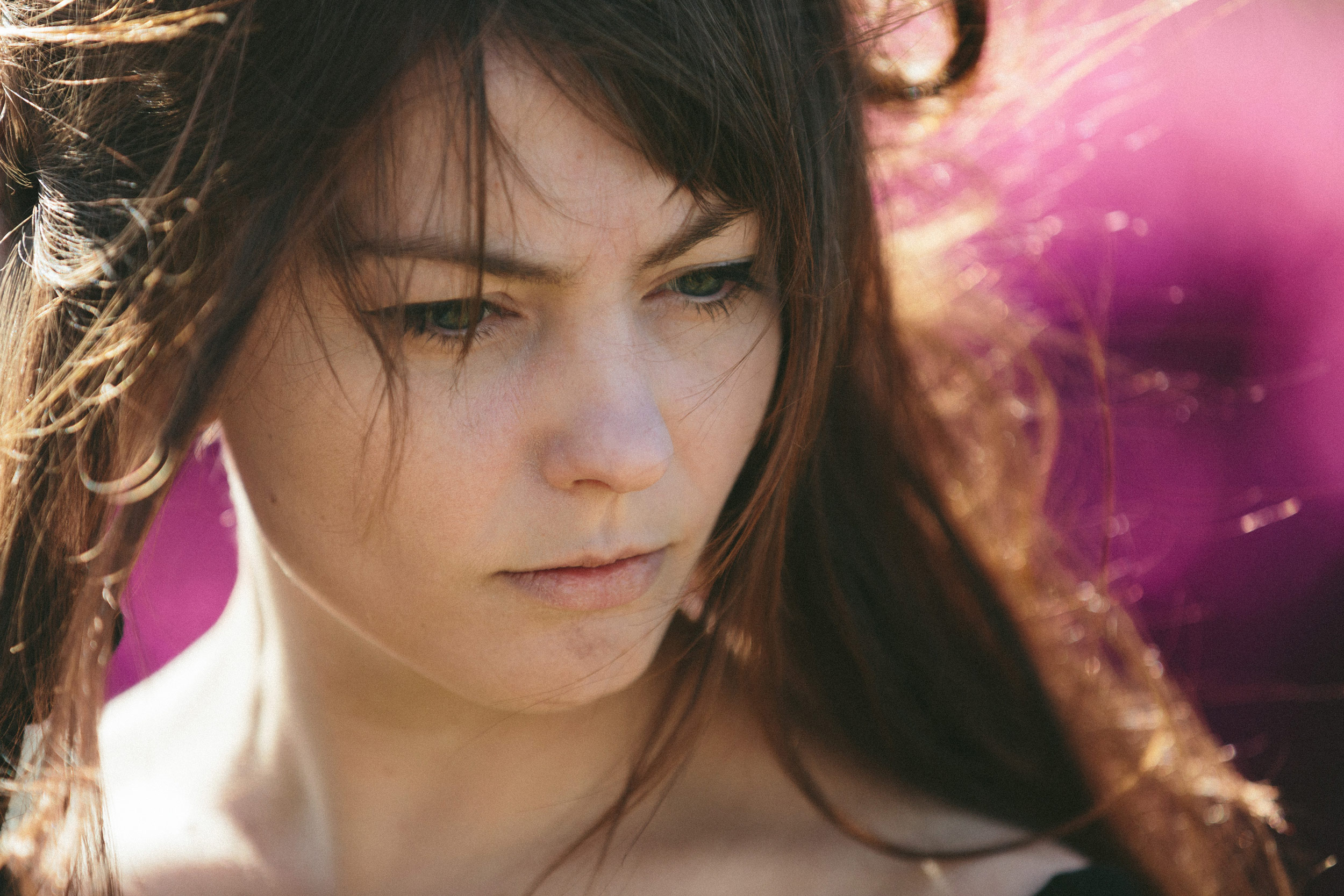
“Maybe [My Woman] is political. Maybe it is feminist. Maybe it is meaningful in all these ways I never intended for it to be, or even realized. Either way, I need to allow others to be able to see something different in what I’ve created; politically, or otherwise.”
There’s always been this sentiment that art, by its very nature, is a political act. Some art may be more radically or overtly political, and some may be circumstantially political, like the experiences you’ve described when My Woman was released. Maybe it is political. Maybe it is feminist. Maybe it is meaningful in all these ways I never intended for it to be, or even realized. Maybe there’s an aspect of my own work that I’m not aware of. I think that’s something I can look back on, and learn from. Either way, I need to allow others to be able to see something different in what I’ve created; politically, or otherwise.
I know there’s a handful of artists who would say, “Oh, I don’t really explain my songs. I don’t like to write the lyrics down. I don’t want anyone to know what they mean.” In an annoyingly dorky way, I’ve always wanted to explain my songs. But, people will read into things and find other truths. When you put something out into the world and they attach meaning to it, it has nothing to do with you at all.
A friend of mine passed away this year. We weren’t that close—he was more of a friend of my ex’s—but his wife told my ex that they had listened to the record quite a bit before he passed away, so she asked if I would perform at the funeral. I was devastated. I thought, I don’t even know them that well. I shouldn’t be this important to them! But when I started thinking more about it, I realized I had forgotten how people will find certain things in the music on their own. The control freak in me wants to correct people, to say that it’s not the “truth,” but I can’t do that.
Truth is such a mutable thing, especially in making art. Did you perform at his funeral then? I did. It was so scary. I’ve performed in front of thousands of people all over the world. I’ve been a backup singer in a big band, and played some big shows. But the hardest shows are weddings and funerals—you just can’t fuck those up.
I can’t even imagine the pressure. Yeah. I mean, it’s not your day—it’s their day. Maybe I shouldn’t be sharing this story. But I like it, because it taught me about not having so much pride to think that it’s all about me, because it really isn’t. They weren’t asking me to be there, they were asking me to facilitate this feeling that I produce for people when I perform music. I played “Tiniest Seed,” and it was so hard. Everyone there was revisiting some sort of grief or loss, and I was just trying not to cry. It was outside, and was almost like a celebration. Everyone kept saying how it felt like his party, and they were just waiting for him to show up.
Oh God! That’s heartbreaking. I know. It was so beautiful. They had a huge bonfire at the end, and everyone lit Chinese lanterns and threw them up in the sky. It made me realize that I should perform those old songs more often, and I should do it to facilitate that kind of feeling. Because it’s not just about coming out with a big record, or having a six-piece band, or playing guitar solos. I have to remember that the music isn’t just about me, but also about how beautiful it can be for other people.
That’s such a great reminder. I think in looking back at our own work, it’s easy to feel like we can’t identify with the artist who was doing that particular thing at that particular time, because it was so long ago, and we’ve continued to evolve. Its a really strange thing to look back at your work and think, I did that, but I’m a different person now. It’s like looking at a stranger; it’s not even my song anymore.
What was it like for you to go back through all of your older material for Phases? Did you learn anything new about yourself throughout that process? It was a little like showing the world my diary. I had gotten everyone’s attention with this big record that did really well, and Phases is showing them all of the things that led me to that point. All of the embarrassing affectations I’ve put on my voice, or the process of a song that’s unfinished, or how this production sounds vs. that one. I think it reveals where I’ve come from, and that I didn’t just spit out a record like My Woman. There was a process; and it took time for me to figure out how to relax into that sound.
“Sweet Dreams,” and “California” are excruciating for me to listen to, because they’re so uptight in comparison to how I’d perform them now. I wasn’t allowing myself to relax into the songs then, and you can tell. I wasn’t used to recording, and I would get so nervous in the studio because I never practiced. Maybe no one will really notice that, or they’ll think it’s endearing.
I look at those old recordings and demos as a kind of palette of different shades of what I was influenced by, and how different production styles and periods of my life affected my writing. I don’t think the work always needs to be piercing, or a huge statement on humanity or relationships. Sometimes, it can just be about an average day. When I look back at that work, I think, These are the things that led me to where I am now. Even just simple, daily things.
There’s a real humanness in that kind of simplicity. From the more major successes in your career, to the smallest everyday-life experiences, do you feel creatively satisfied? I lost a lot this year. Meanwhile, everyone was congratulating me on this record and on my successes. But there was a lot going on underneath it. I had to keep things to myself, and I had to be strong. Despite the mess, and all of the things people couldn’t see, I had to be a leader. And it was really hard.
Being on tour and making records is isolating and difficult, but this was different. I was incredibly alone, and at the same time, I was playing all of these shows and everyone was telling me how great I was. I performed at Pitchfork this summer, and had three panic attacks that day before playing because of things that were going on in my life. If you look at that video, though, you can’t tell. I had to take all of the things that were happening, and put them into context. I thought, If this is the worst that can happen, at least you can still go out onto this stage and perform your songs, and for this one hour and a half it will be fun.
And, was it fun? It was! And you know, other times it’s not. But you’re always learning, even when it’s not.
I went on a two-month European tour with the band, and we almost killed each other. We went through so much, and endured each other so well—all for the sake of My Woman. Our last show of the tour was in Asheville. We played for two hours, and it was really emotional. It was like that point in a relationship when you think it should be over, and you’re telling your girlfriends it has to end, and then you get over the hump and you think, I love this person even more now! We’ve gone through so much. We’ve peeled back all the layers.
No matter how hard things get, it’s important to remember those moments when you’re feeling like it could all end. And then what? You remember how much you really like doing this, even on the very worst days. Because playing for people who care—whose lives you get to be a part of and impact—is the point. And I hope to get to do it all over again, because it’s a real privilege. 
“Its a really strange thing to look back at your work and think, I did that, but I’m a different person now. It’s like looking at a stranger; it’s not even my song anymore…it’s not just about coming out with a big record, or having a six piece band, or playing guitar solos. I have to remember that the music isn’t just about me, but how beautiful it can be for other people.”
